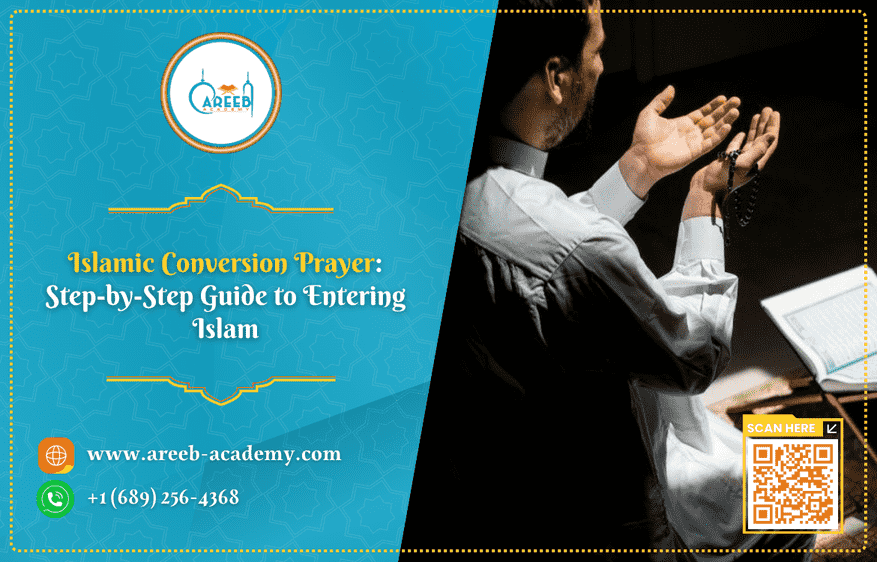
Islamic Conversion Prayer, known as the Shahada (الشهادة), is the sacred declaration that marks a person’s entry into Islam. It is simple but deeply powerful. These words can transform the heart, renew the soul, and open the door to a life of peace, faith, and purpose.
By saying “Ash-hadu an la ilaha illa Allah, wa ash-hadu anna Muhammad rasul Allah” — meaning “I bear witness that there is no god but Allah, and I bear witness that Muhammad is the Messenger of Allah” — a person affirms belief in the Oneness of God and the finality of Prophet Muhammad’s message.
Saying the Islamic Conversion Prayer is not just about changing religion. It is about discovering truth, submitting to the Creator, and starting a spiritual rebirth filled with forgiveness and divine mercy. For many, this moment brings tears of relief, a profound sense of belonging, and a feeling of finally “coming home.”
In this guide, we will explore the meaning, steps, and significance of the Islamic Conversion Prayer (Shahada). You will learn what the words mean and what to do after embracing Islam. You will also discover how to continue your journey through prayer, Quran learning, and guided mentorship at Areeb Academy, where new Muslims are supported every step of the way.
Whether you are ready to take the Shahada, recently embraced Islam, or simply seeking clarity about this beautiful declaration of faith, this article will help you understand its power, beauty, and lasting impact on the soul.
What Is the Islamic Conversion Prayer?

The Islamic Conversion Prayer, known in Arabic as the Shahada, is the sacred declaration that opens the door to Islam. It is the very foundation of the Muslim faith — a simple yet deeply meaningful testimony that expresses one’s complete belief in the Oneness of Allah and in Prophet Muhammad ﷺ as His final messenger.
Reciting the Shahada is not merely a formality; it’s a moment of profound transformation. With these few words, a person’s heart turns toward faith. Their life gains a new sense of peace, purpose, and connection with Allah. Whether whispered in private or spoken before witnesses, the Islamic Conversion Prayer marks the beautiful beginning of one’s journey into Islam. This journey is filled with guidance, mercy, and spiritual growth.
Meaning of Islamic conversion prayer “Shahada” – The testimony of faith
The word “Shahada” (الشهادة) comes from the Arabic root sh-h-d (ش-ه-د), meaning to witness, to testify, or to bear witness to the truth. In Islam, the Shahada represents the core testimony of faith — the verbal declaration that transforms a person into a Muslim. It is both a spiritual and legal statement, affirming two essential beliefs: that there is no deity worthy of worship except Allah, and that Muhammad ﷺ is His final Messenger.
This testimony reflects the very essence of Tawhid (the oneness of God), which lies at the heart of Islam. By reciting it with sincerity, a person acknowledges Allah as the only true God — the Creator, Sustainer, and Ruler of all existence. They also accept Prophet Muhammad ﷺ as the final conveyor of divine guidance. The Shahada, therefore, is not just a phrase; it’s a lifelong commitment to faith, worship, and obedience to Allah.
The exact Arabic wording of the Islamic conversion prayer
The Islamic Conversion Prayer, or the Shahada, is beautifully simple yet profoundly meaningful. Its original Arabic wording is:
أَشْهَدُ أَلَّا إِلٰهَ إِلَّا اللّٰهُ، وَأَشْهَدُ أَنَّ مُحَمَّدًا رَسُولُ اللّٰهِ
Ash-hadu alla ilaha illa Allah, wa ash-hadu anna Muhammadan rasul Allah.
This translates to:
“I bear witness that there is no god but Allah, and I bear witness that Muhammad is the Messenger of Allah.”
This statement consists of two parts, known as the two testimonies (ash-shahādatān):
- Lā ilāha illā Allah — “There is no god but Allah,” expressing complete monotheism.
- Muhammadur rasūl Allah — “Muhammad is the Messenger of Allah,” acknowledging his Prophethood.
Translation and meaning of the Islamic conversion prayer in English
In English, the Shahada is often translated as:
“There is no god but God, and Muhammad is the Messenger of God.”
The word “God” here is capitalized to indicate the unique, singular nature of the divine being, as opposed to the general term “god” which can refer to any deity. This distinction mirrors the Arabic meaning, where Allah is not a generic term but the proper name of the One True God.
The first part of the Shahada affirms Islam’s monotheistic foundation. It rejects all forms of idolatry and declares that only Allah is worthy of worship. The second part points to the path of guidance through the teachings of Prophet Muhammad ﷺ, who brought the final revelation, the Quran. Together, both parts summarize the entire message of Islam: faith in Allah’s oneness and obedience to His Messenger.
Reciting the Shahada sincerely, even once, is all that is required to enter Islam. Yet beyond the words lies a deeper meaning: a spiritual rebirth, where the heart aligns with divine truth, and life gains new direction through faith, mercy, and submission to Allah.
How to Say the Islamic Conversion Prayer Step-by-Step
Preparing your heart and intention (niyyah)
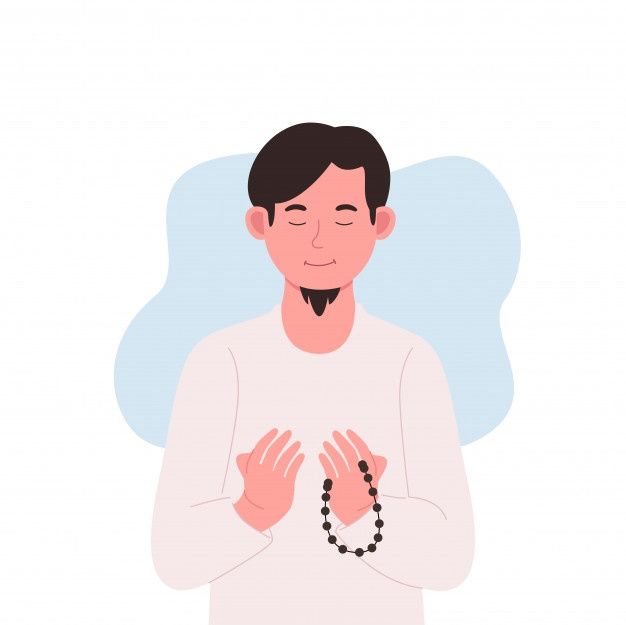
Before saying the Islamic Conversion Prayer (Shahada), it’s important to prepare your heart with sincerity and clarity. In Islam, every act of worship begins with niyyah — the intention. This means you should consciously and willingly decide to embrace Islam, seeking closeness to Allah and truth in your heart. There is no need to say your intention out loud; it is a personal commitment between you and your Creator.
Take a quiet moment to reflect on what this decision means — a new beginning guided by faith, mercy, and purpose. Embracing Islam through the Shahada is not about joining a group, but about submitting your heart fully to the One God who created you. When your heart feels at peace and ready, you can move on to making the declaration itself.
The correct pronunciation of the Shahada
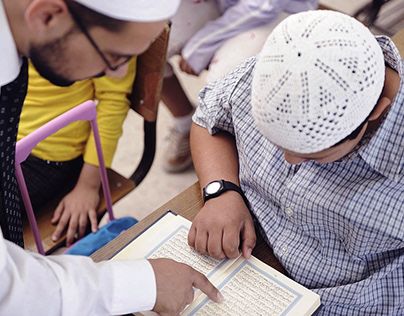
When you’re ready to say the Shahada, try to pronounce it slowly and clearly, understanding every word as you say it. The Arabic declaration is:
أَشْهَدُ أَلَّا إِلٰهَ إِلَّا اللّٰهُ، وَأَشْهَدُ أَنَّ مُحَمَّدًا رَسُولُ اللّٰهِ
Ash-hadu an la ilaha illa Allah, wa ash-hadu anna Muhammadan rasul Allah.
This means:
“I bear witness that there is no god but Allah, and I bear witness that Muhammad is the Messenger of Allah.”
It’s not about perfect pronunciation — what matters most is the sincerity behind your words. You can listen to a recording or repeat after a Muslim teacher to learn the correct pronunciation. What counts is that you understand what you are saying and truly believe it in your heart.
Some people choose to perform Ghusl (a full shower) before or after saying the Shahada, as a symbol of purification and a fresh start. This act is recommended but not mandatory; Islam values your inner purity and intention above all.
Witnessing and confirming your declaration
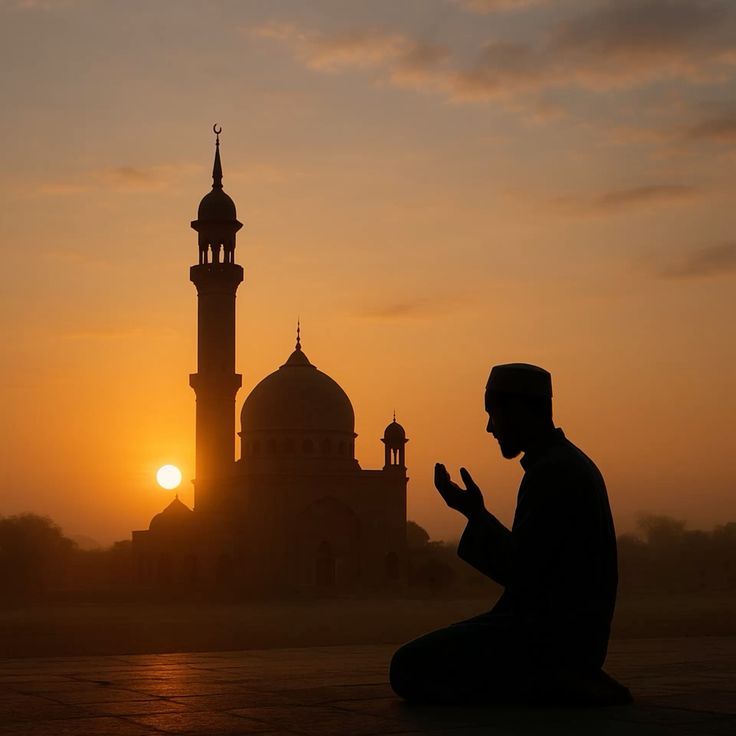
After saying the Islamic conversion prayer (Shahada) with conviction, you have officially entered Islam. This is a moment both simple and deeply meaningful. Many new Muslims choose to declare their Shahada in front of witnesses, such as family, friends, or at a mosque. However, it is also valid if said alone, as Allah is the ultimate Witness.
From this moment on, you are part of the global Muslim community (Ummah). It’s a beautiful new journey of learning, prayer, and connection with Allah. You can begin by learning how to perform the five daily prayers (Salah) and deepening your understanding of the Shahada, starting with short recitations and simple steps. Don’t worry about perfection — what matters is consistency and sincerity.
Every act of learning and worship after saying the Islamic conversion prayer (Shahada) strengthens your faith. It also brings you closer to Allah. Remember, embracing Islam is not the end. It is the beginning of a lifelong relationship with Allah, built on love, mercy, and divine guidance.
The Power and Meaning of the Islamic conversion prayer
The Islamic conversion prayer (Shahada) is the heart of Islam — the declaration that defines a Muslim’s faith, life, and purpose. It reminds believers of the oneness of Allah and the unique role of Prophet Muhammad ﷺ as His messenger. This simple yet profound statement shapes every aspect of a Muslim’s life — from daily prayers to the final moments before death — guiding the heart toward faith, humility, and devotion.
“There is no god but Allah” – affirming pure monotheism
The first part of the Shahada, “La ilaha illa Allah” (لَا إِلٰهَ إِلَّا اللّٰهُ), proclaims the essence of Tawhid, the absolute oneness of Allah. It means that no being, power, or creation deserves worship except Allah alone. Every act of prayer, gratitude, or reliance flows from this central truth.
By affirming that there is no god but Allah, a believer rejects all forms of idolatry, pride, and reliance on worldly illusions. This statement purifies the heart from attachment to anything other than the Creator. It is more than a declaration of faith. It is a commitment to live in constant awareness of Allah’s presence — trusting Him, seeking His help, and submitting to His will in every part of life.
“Muhammad is the Messenger of Allah” – following divine guidance
The second part of the Islamic conversion prayer (Shahada), “Muhammadur Rasul Allah” (مُحَمَّدٌ رَسُولُ اللّٰهِ), acknowledges Prophet Muhammad ﷺ as the final messenger who delivered Allah’s last revelation — the Quran. This belief guides Muslims to follow his teachings, character, and example in all matters of life.
Through the Prophet ﷺ, believers learn how to pray, show mercy, seek justice, and live with humility and compassion. This part of the Shahada reminds Muslims that Muhammad ﷺ was not divine — he was a servant and messenger of Allah — and that guidance comes only from Allah through His chosen messengers. It connects faith with action, transforming belief into a practical way of life built on sincerity, love, and moral excellence.
The transformation it brings to the soul
Reciting the Islamic conversion prayer with conviction marks a spiritual rebirth. It cleanses the heart from past disbelief and fills it with light, peace, and purpose. From that moment, a person’s life takes a new direction — one centered on faith, guided by prayer, and enriched by the remembrance of Allah.
The Shahada is not just words spoken once. It is a lifelong commitment that renews with every prayer and act of obedience. Muslims hear it from birth and strive to have it on their lips at death. It serves as a constant reminder of the ultimate truth: that Allah alone is worthy of worship, and Muhammad ﷺ is His Messenger.
What Happens After Saying the Islamic Conversion Prayer
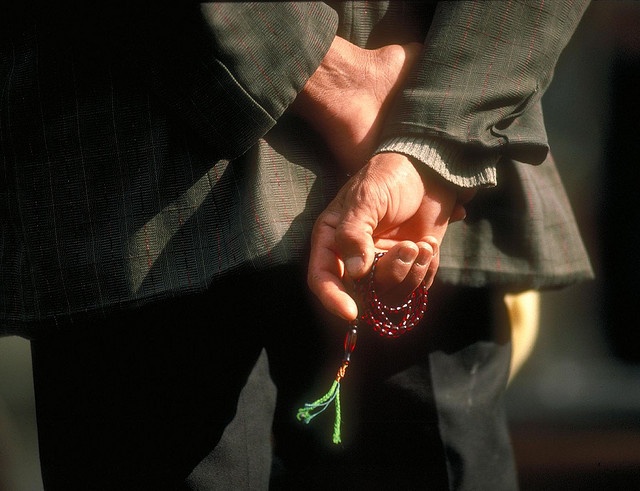
Embracing Islam by saying the Shahada marks not just a change of religion, but the beginning of a new, purposeful, and peaceful way of life. The person’s heart opens to faith, and their past becomes a story of learning and mercy. Here’s what spiritually unfolds after uttering the words: “I bear witness that there is no god but Allah, and I bear witness that Muhammad is the Messenger of Allah.”
Islamic conversion prayer brings spiritual rebirth and forgiveness of all past sins
The moment a person sincerely declares the Islamic conversion prayer, they experience what Islam beautifully calls a spiritual rebirth. Every past sin, mistake, and regret is completely forgiven by Allah — as if one’s record has been wiped clean and a new chapter begins. Prophet Muhammad ﷺ said,
أَمَا عَلِمْتَ أَنَّ الإِسْلاَمَ يَهْدِمُ مَا كَانَ قَبْلَهُ
“Islam erases whatever came before it.” (Sahih Muslim 121)
This divine mercy reflects Allah’s unmatched compassion. No matter how dark or distant one’s past may have been, conversion to Islam resets the heart to purity. From that moment, all good deeds are recorded as rewards, and even the intention to do good is counted with Allah’s generosity. It’s a renewal of the soul — freedom from guilt, shame, and fear — replaced with peace, gratitude, and hope for Paradise.
Starting your journey as a new Muslim
After saying the Shahada, you officially become a Muslim — part of a worldwide community united by faith and compassion. This is the beginning of a journey filled with learning, prayer, and spiritual growth. It’s normal to feel both joy and curiosity as you take your first steps into Islam.
You may start by connecting with other Muslims at a nearby mosque or online community. Many find comfort in talking to an imam or mentor who can guide them through the basics of belief and practice. This stage is not about perfection — it’s about progress. Every small step, from learning a short prayer to reading a verse of the Quran, strengthens your relationship with Allah.
You are not expected to know everything right away; Islam is a journey of continuous learning, reflection, and improvement. What matters most is your sincerity and your willingness to grow in faith.
Learning the basics of worship and belief
Once you’ve embraced Islam, it’s encouraged to gradually learn the fundamentals of worship — such as how to perform the five daily prayers (Salah), understand basic Islamic beliefs, and develop a personal connection with the Quran. These acts are not mere rituals; they are direct conversations with Allah and a source of daily peace and structure.
Start with the essentials: learning how to make wudu (ablution), performing short prayers, and reading simple surahs like Al-Fatiha. Over time, you can explore fasting in Ramadan, giving charity (Zakat), and understanding the deeper meanings of the faith.
Through this steady process, your heart becomes more attached to Allah, and your actions reflect your new identity as a believer. Islam isn’t just about worship — it’s a complete way of life that nurtures kindness, honesty, patience, and gratitude.
In short: Saying the Islamic conversion prayer is not the end of a journey. It is the beautiful beginning of one. From forgiveness to faith, and from faith to peace, every moment after your conversion becomes an opportunity to draw closer to Allah. It is a chance to live with purpose, sincerity, and love.
Emotional and Spiritual Feelings After Embracing Islam
Embracing Islam is often described as a life-changing experience — one that touches the heart and transforms the soul. Many new Muslims describe an indescribable peace, a sense of “coming home,” and a closeness to Allah that brings tears of gratitude. Saying the Shahada often feels like the start of a new life. The past fades, and a brighter, more purposeful path unfolds.
Inner peace and clarity
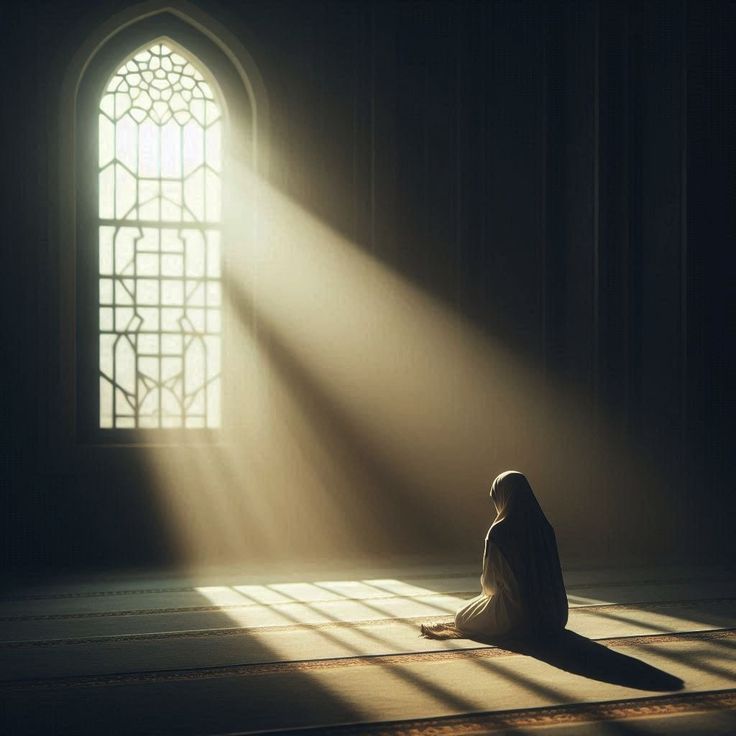
After embracing Islam, many converts describe feeling an inner stillness unlike anything they’ve known before. It’s as if a lifelong search for truth has finally reached its destination. This peace is not merely emotional; it’s deeply spiritual — a tranquility born from surrendering to Allah’s will.
The heart that once carried confusion or guilt begins to feel lighter, calmer, and more focused. The belief that Allah has forgiven all past sins brings immense relief, allowing new Muslims to move forward without fear or regret. This clarity often inspires a renewed sense of gratitude and mindfulness in everyday life.
Sense of belonging and purpose
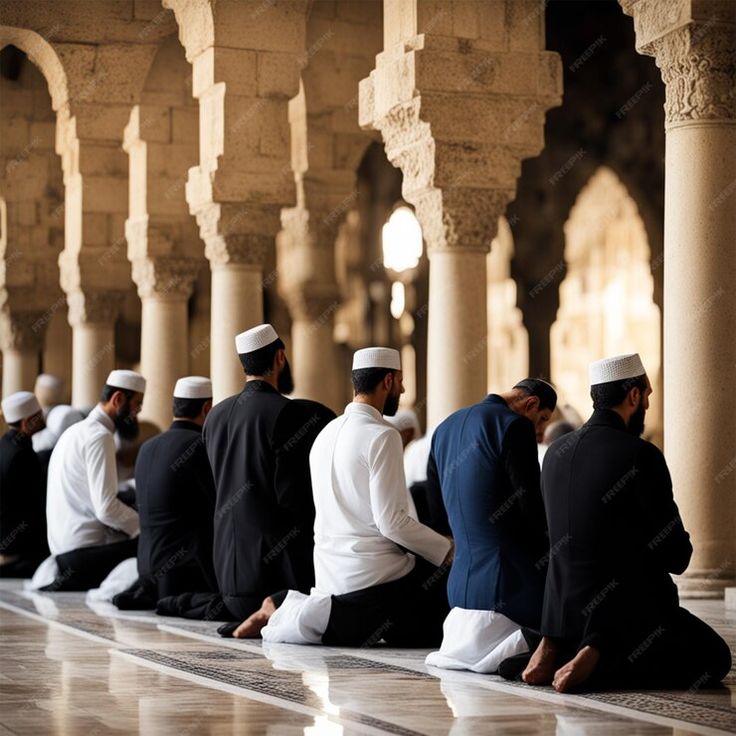
Islam provides not just faith, but also community and direction. For many converts, joining the Muslim ummah feels like becoming part of a family that shares the same values, prayers, and hope for eternal peace. This sense of belonging fills the emptiness that many once felt — offering companionship, guidance, and shared joy in worship.
Spiritually, Islam gives life a clear purpose: to know and worship Allah. Every act — from daily prayer to showing kindness — becomes meaningful. The promise of Jannah (Paradise) gives strength and hope, especially in times of challenge. It’s a journey of self-discovery, guided by faith, compassion, and the constant remembrance of Allah.
Strengthening your bond with Allah
Conversion marks the beginning of a personal and intimate relationship with Allah — one built on love, trust, and sincerity. Many new Muslims experience moments of deep emotion during prayer, sometimes moved to tears as they feel Allah’s mercy and closeness for the first time.
As the heart grows in faith, so does the desire to please Allah and draw nearer to Him through prayer, Quran recitation, and good deeds. Islam encourages believers to speak to Allah directly — in joy, sorrow, or need — knowing He listens and responds. Over time, this bond becomes the core of one’s peace, resilience, and purpose in life.
How to Learn Islam After Conversion
After embracing Islam, the journey of learning truly begins. Islam is a complete way of life — one that nurtures the heart, mind, and soul — and taking the first steps to understand it deeply can feel both exciting and overwhelming. That’s why learning gradually, with the right guidance and support, makes all the difference.
Learning how to pray (Salah) and recite Quran
One of the first things new Muslims focus on is learning how to pray (Salah) and recite the Quran. Salah is the daily connection between you and Allah, performed five times a day, and it’s the foundation of a Muslim’s spiritual routine. Starting with short chapters from the Quran, you can learn the meaning and pronunciation at your own pace. With time, this daily practice becomes a source of peace and grounding in your new faith.
Finding reliable teachers and supportive communities
Finding reliable teachers and a supportive Muslim community is also essential. Having mentors who understand the challenges of conversion — whether cultural, emotional, or spiritual — helps new Muslims stay consistent and confident in their faith journey.
Enrolling in beginner-friendly Islamic classes online
At Areeb Academy, we understand how meaningful and personal this stage is. Our New Converts Courses are designed especially for beginners who are still getting familiar with Islamic teachings. Classes are taught by qualified and compassionate teachers who guide you gently, step by step — from learning how to perform Salah and read the Quran, to understanding basic Islamic beliefs and daily practices.
Why Choose Areeb Academy to Begin Your Islamic Journey
What makes Areeb Academy special is the personalized mentorship each student receives. You’re never just attending a class. You are joining a caring community that supports you, answers your questions, and helps you grow spiritually. Lessons are offered online, making it easy to learn from anywhere in the world. Free trial classes are available so you can experience the warmth and approach firsthand.
With the right guidance, sincere effort, and connection with knowledgeable teachers, learning Islam after conversion becomes a joyful and enlightening experience. It strengthens faith, deepens understanding, and brings you closer to Allah.
Final Thoughts
Saying the Islamic conversion prayer (Shahada) marks the start of one of the most beautiful journeys a person can take — a journey toward truth, peace, and a closer relationship with Allah. It’s not just a spoken testimony; it’s a heartfelt commitment to live a life guided by faith, compassion, and purpose.
Becoming Muslim doesn’t mean you have to know or do everything perfectly from the start. What truly matters is sincerity — a genuine desire to worship Allah and grow spiritually, step by step. With every prayer, every act of kindness, and every bit of knowledge you gain, your connection with Allah deepens.
If you’ve just embraced Islam, remember: you are never alone. Areeb Academy offers beginner-friendly Islamic courses designed especially for new Muslims — covering Salah, Quran reading, and Islamic basics in a warm, supportive environment. Start your journey with confidence and love. 💫 Book your free trial class today and begin learning Islam at your own pace, with teachers who guide you every step of the way.
Frequently Asked Questions about the Islamic Conversion Prayer
- Do I need witnesses to say the Shahada?
Having witnesses when saying the Islamic conversion prayer (Shahada) is recommended but not required. Witnesses can help confirm your declaration publicly and welcome you into the Muslim community, but Allah alone is the ultimate Witness. Your Shahada is completely valid even if said in private.
2. What should I do immediately after conversion?
After saying the Islamic conversion prayer (Shahada), it’s recommended to take a shower (Ghusl) as a symbol of purification. Then begin learning the basics of Islam — how to pray (Salah), how to read simple Quranic verses, and how to perform daily worship.
3. What if I make mistakes while learning how to pray or recite Quran?
Mistakes are completely normal, especially in the beginning. Allah rewards your effort and intention, even if your pronunciation or actions aren’t perfect. The Prophet Muhammad ﷺ said that those who struggle while reciting the Quran get double the reward — one for reading, and one for their effort. Keep practicing with patience and sincerity.
4. Can I still live with my non-Muslim family?
Yes, Islam encourages kindness, respect, and good treatment toward parents and family members — regardless of their faith. Becoming Muslim does not mean cutting ties; rather, it calls for better character and compassion. Your good manners can become a source of guidance for others.
5. What if I feel overwhelmed or confused after conversion?
It’s completely normal to feel a mix of emotions — joy, confusion, or even uncertainty. Conversion is a big life change, and spiritual growth takes time. Try to stay connected with supportive teachers, such as those at Areeb Academy, and take small, consistent steps. Remember, Islam is a journey, not a race.


